Why do people continue to fall in love with certain dogs, even when they know those pups may face a lifetime of medical challenges?
The answer often comes down to a mix of loyalty, personality, and the deep bond that grows between humans and their pets.
According to the American Kennel Club, research on 24 hereditary disorders showed that more than half had no significant difference in prevalence between purebred and mixed-breed dogs.
This highlights that while certain breeds may carry well-known risks, health challenges are not exclusive to them. Still, some of the most beloved breeds remain particularly prone to conditions such as breathing problems, joint issues, or skin disorders.
This illustrates how love can sometimes outweigh logic when it comes to choosing a furry companion. People admire their unique looks, affectionate natures, or family-friendly personalities, even if these dogs are prone to illness and require more visits to the vet.
In this article, we’ll examine several unhealthy dog breeds that people love despite their health struggles, exploring both their charm and the challenges they present.
Unhealthy Dog Breeds People Love Despite Health
1. English Bulldog

Have you ever met a dog who looks tough on the outside but is really a big softie inside?
That’s the English Bulldog.
The English Bulldog is one of the most recognizable dog breeds in the world, famous for its wrinkled skin, wide head, and gentle personality. Many pet parents adore these pups because they are calm, loyal, and make great companions for the whole family. Yet, this lovable charm comes with challenges.
Bulldogs are brachycephalic breeds, which means their short noses often cause breathing issues and overheating during warmer months. Sadly, these pups are genetically predisposed to a whole host of health problems, from hip dysplasia and skin infections to heart conditions that can be life-limiting.
Regular trips to the vet and early treatment options are important to manage these risks. Despite these issues, people continue to love them, and for good reason—they bring a calm presence and endless affection into any home.
Did you know these were once bred for bull-baiting? Over time, they were transformed into today’s affectionate, lazy companions who would rather nap than fight.
2. Pug

What do you get when you mix a clown’s personality with a dog’s loyalty?
You get a Pug!
They are one of the most popular breeds among pet parents, due to their playful spirit and adorable faces. Their round heads, curled tails, and constant desire for attention make them perfect family companions. But their small size doesn’t mean they’re free from challenges.
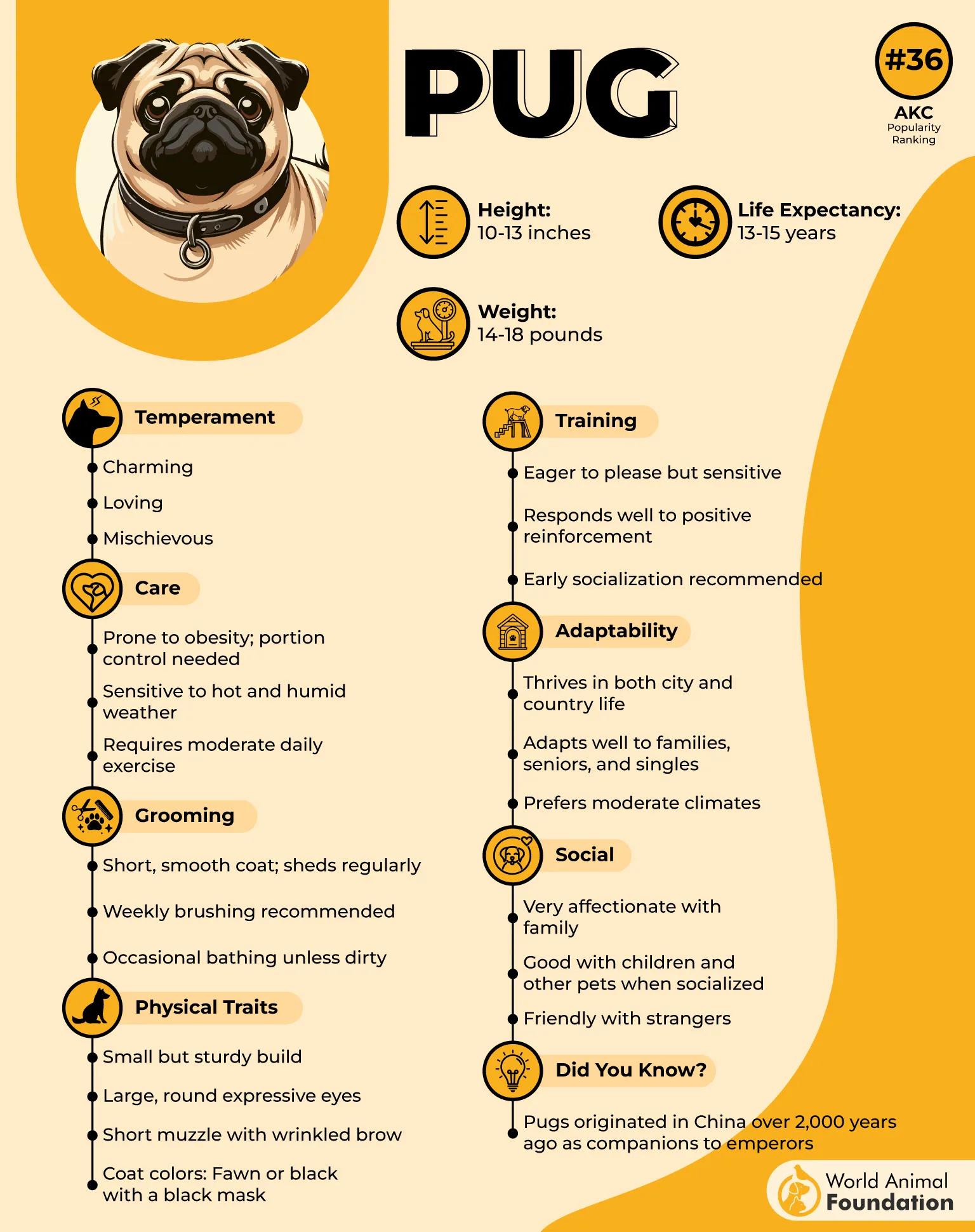
Many Pugs are prone to obesity, which can worsen joint troubles like elbow dysplasia and even hip dysplasia as they age. Due to their compact bodies, even a few extra pounds can put stress on their frame. They also tend to experience skin allergies, chronic ear infections, and even neurological issues.
These problems are often genetically predisposed, meaning they can occur without warning. While there are treatment options, they typically require regular veterinary care.
Still, people continue to adore these pups for their fun-loving nature and endless affection. They remind us that even unhealthy dogs can bring plenty of joy and life into a home. You just need to be extra caring for these health-sensitive dogs.
In ancient China, they were treasured by emperors and even had their own guards to protect them inside the palace.
3. French Bulldog

Ever meet a tiny dog with a big personality that can brighten up any room?
That’s a French Bulldog for you!
French Bulldogs are small but extremely affectionate, making them a favorite among pet owners who live in apartments or busy cities.
Their compact bodies are muscular and sturdy, and they love cuddling with the family. However, their charming size comes with genetic issues, including heart failure, spinal problems, and digestive sensitivities.
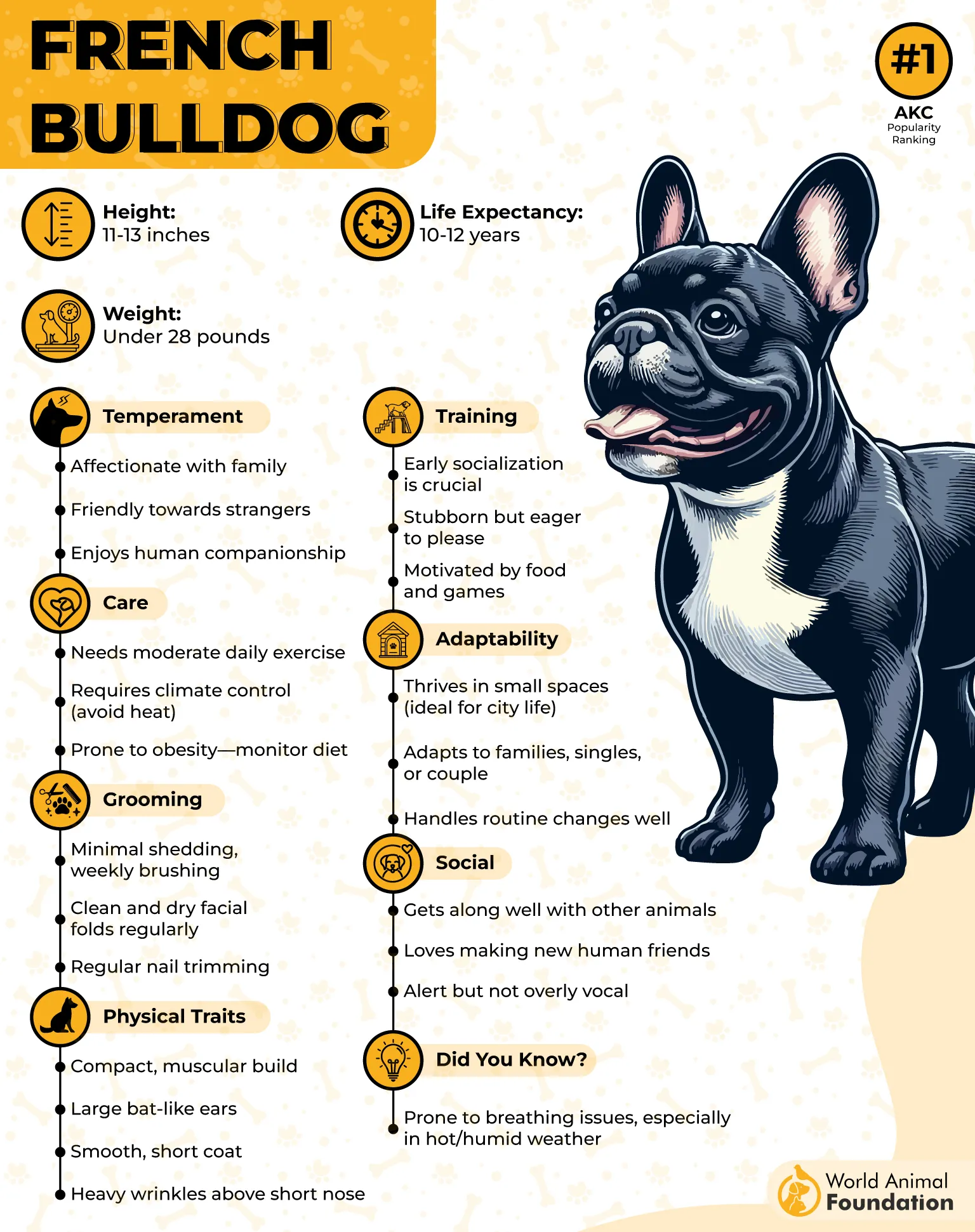
Even simple activities can sometimes be a challenge, which is why regular vet check-ups are essential. This breed is also prone to skin allergies, atopic dermatitis, and recurring infections that require ongoing care.
French Bulldogs tend to be sensitive to extreme temperatures, which can impact their overall health and quality of life.
Despite these challenges, their playful, affectionate, and comical nature keeps them high on the list of most popular breeds. They remind family that love and loyalty often outweigh potential health problems.
Fun Fact
They were originally bred to be ratters and companions for lace workers in France. Today, they are more famous for stealing hearts than chasing pests!
4. Dachshund

Who knew a dog with a long body and short legs could pack so much personality?
Meet the Dachshund!
They are playful, curious, and full of spirit, making them beloved pets for families and apartment dwellers alike. Their unique long backs and short legs, while adorable, make them especially prone to spinal problems and paralysis.
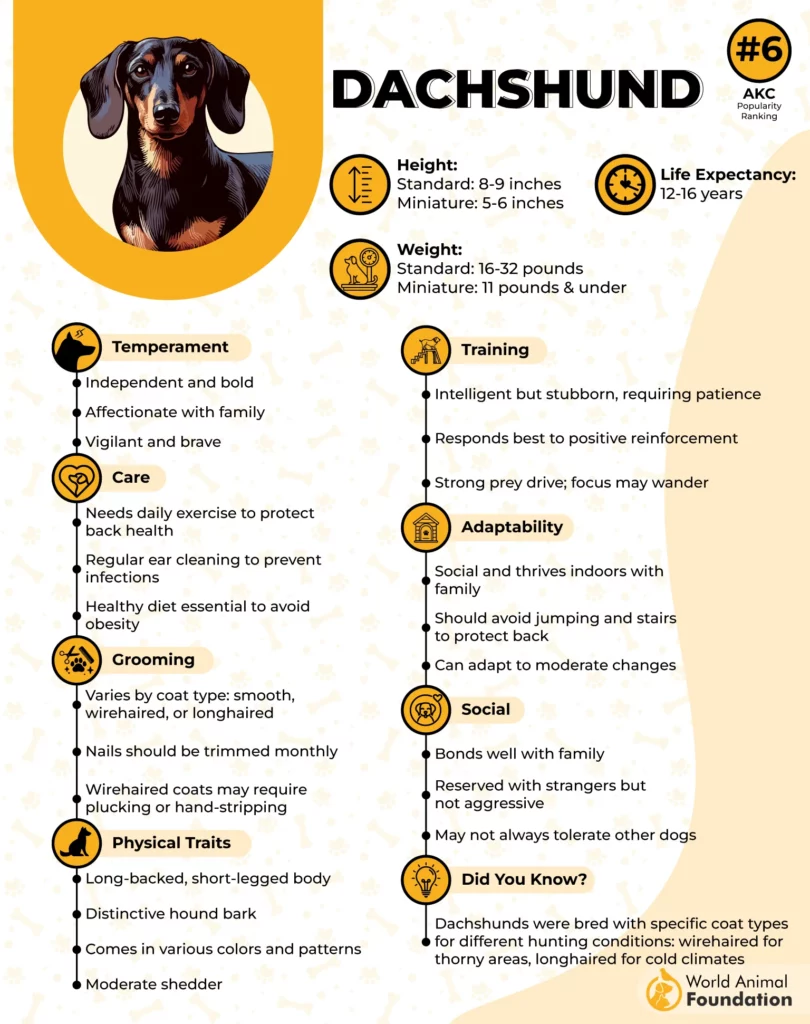
Even a simple jump or climb can sometimes lead to serious injuries, so extra care is needed to protect their flexible bodies to prevent harm. In addition to spinal issues, they often suffer from obesity, which worsens joint problems and can lead to early-life health complications.
They may also develop skin infections and digestive sensitivities. Regular vet visits and a carefully monitored diet are essential to help them live a happy, active life. Careful support during play and exercise helps with healing after back injuries.
Despite these challenges, their bravery, loyalty, and playful nature make them hard to resist.
Fun Fact
They were originally bred to hunt badgers, and their name literally means “badger dog” in German.
5. German Shepherd
Ever met a dog so smart it seems to read your mind?
That’s the German Shepherd.
These Shepherds are famous for their intelligence, loyalty, and protective instincts, making them a top choice for families, police work, and service dogs. Their athletic build and active nature require consistent exercise and mental stimulation.
However, this beloved breed is genetically predisposed to several serious health problems, including hip dysplasia, elbow dysplasia, and a higher risk of certain cancers. These issues can impact their mobility and quality of life as they age.
Beyond skeletal problems, they can also develop heart conditions and epilepsy, which may require long-term treatment and careful monitoring by a vet.
Despite these challenges, they remain one of the most admired dog breeds, due to their unwavering loyalty, courage, and ability to bond deeply with families. Their intelligence and trainability make them standout companions, even when health issues arise.
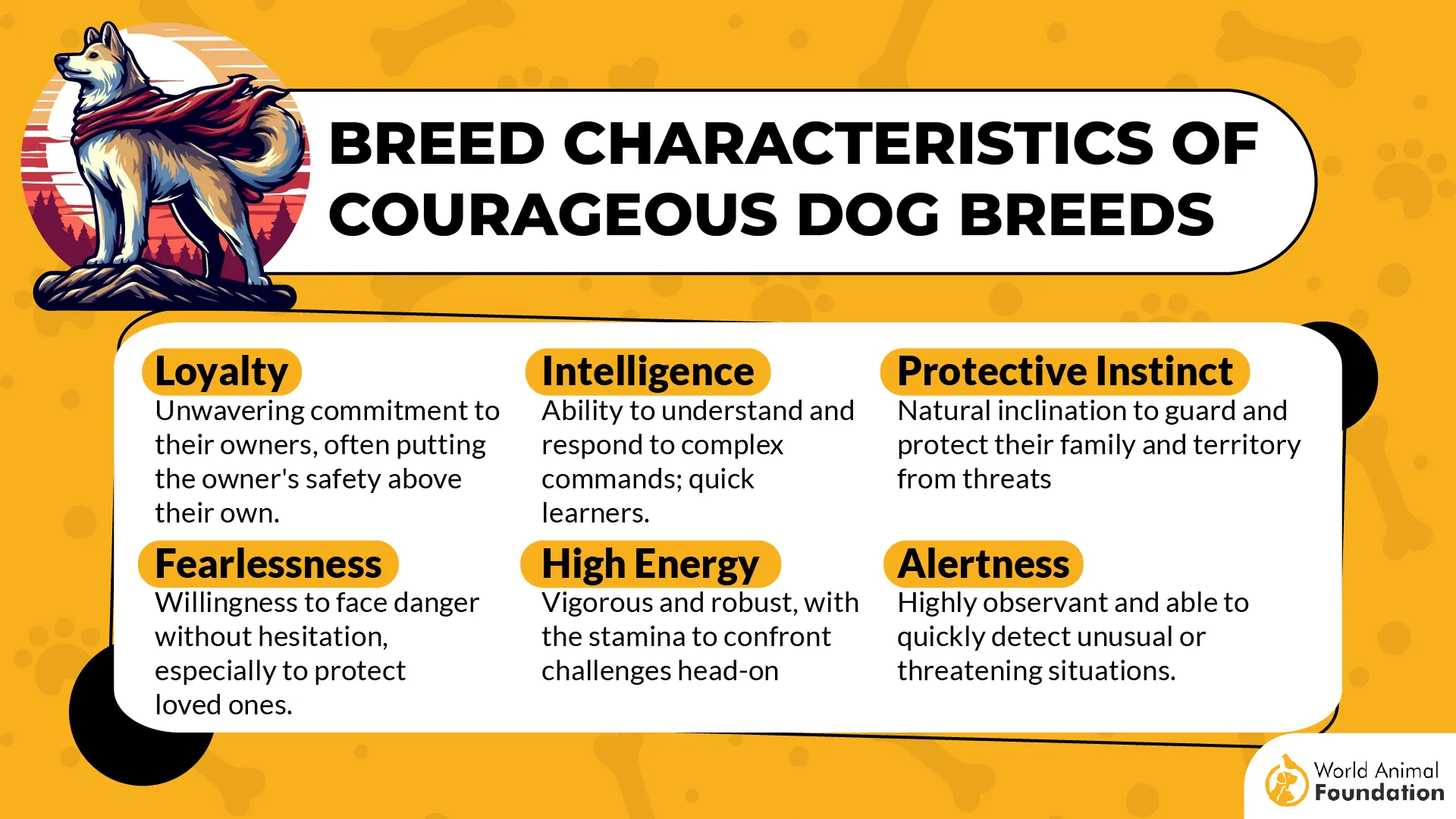
Fun Fact:
According to Wikipedia, these Shepherds were originally bred in Germany for herding sheep, but their versatility quickly made them favorites for military and police work worldwide.
6. Great Dane
Ever seen a dog so big it makes your furniture look tiny?
That’s the Great Dane!
Great Danes are often called gentle giants for a reason. Their towering size and calm nature make them loving companions for families, yet their massive bodies come with significant health challenges.
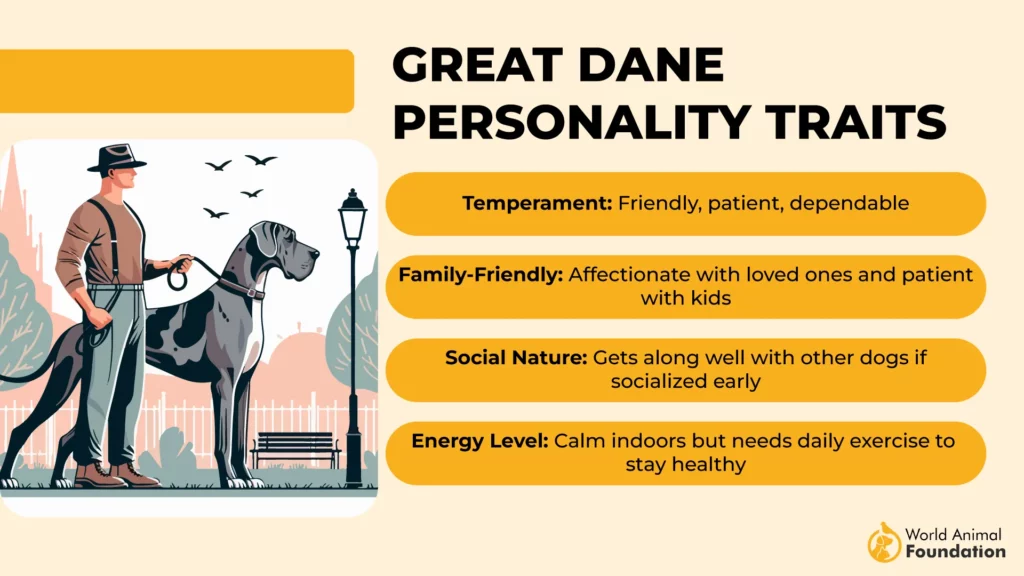
Great Danes may face serious health problems that can shorten their lifespan, so regular vet visits are essential. They are especially prone to bloat (gastric torsion), which can be life-threatening if not treated immediately.
Their fast growth also puts stress on joints, making hip dysplasia and elbow dysplasia common concerns. In addition to skeletal and digestive issues, these breeds have a short lifespan range, making preventive care especially important.
Due to their size, they require careful veterinary monitoring, a proper diet, and moderate exercise to maintain their health and energy. Despite these hurdles, their loving and loyal personalities, along with their gentle temperaments, make them highly cherished dogs.
Fun Fact
The Great Dane is known as the “Apollo of dogs” due to its majestic stature and elegant movement.
7. Cavalier King Charles Spaniel
Could a tiny dog have a heart as big as its personality?
The Cavalier King Charles Spaniel does!
These small, affectionate dogs are beloved by families for their gentle nature and love of cuddling.
Their silky coats and expressive eyes make them perfect lap pets, but they are also genetically predisposed to serious heart problems, including mitral valve disease. Regular cleaning of the mouth can prevent infections and keep small dogs healthy.
Early detection is critical, as untreated heart issues can dramatically affect their life span and quality of health. In addition to heart concerns, Cavalier King Charles Spaniels are prone to ear infections, syringomyelia (a neurological condition), and skin diseases.
These health challenges require regular check-ups with a vet and careful attention from humans. Despite these hurdles, their sweet temperament, loyalty, and adaptability make them a favorite among pet owners who value companionship over perfect health.
Fun Fact
The Cavalier King Charles Spaniel was a favorite of British royalty, including King Charles II, who adored their friendly and loyal nature and hence is named after him.
Conclusion
Although these beloved but unhealthy breeds often struggle with various medical issues, their charm, loyalty, and one-of-a-kind personalities still capture the hearts of dog lovers around the world.
From the playful antics of Pugs to the gentle presence of Great Danes, each breed brings something special to a home, even if they are prone to genetic issues, skin allergies, or life-limiting conditions.
Being aware of their potential health struggles allows families to provide better care, regular vet visits, and appropriate treatment options, ensuring these beloved dogs live happy and fulfilling lives.
Providing the correct diet and physical exercise can improve the quality of life even for unhealthy dog breeds.
Ultimately, the love and joy these popular breeds offer often outweigh the challenges, reminding us that companionship, loyalty, and fun are sometimes more important than perfect health.


